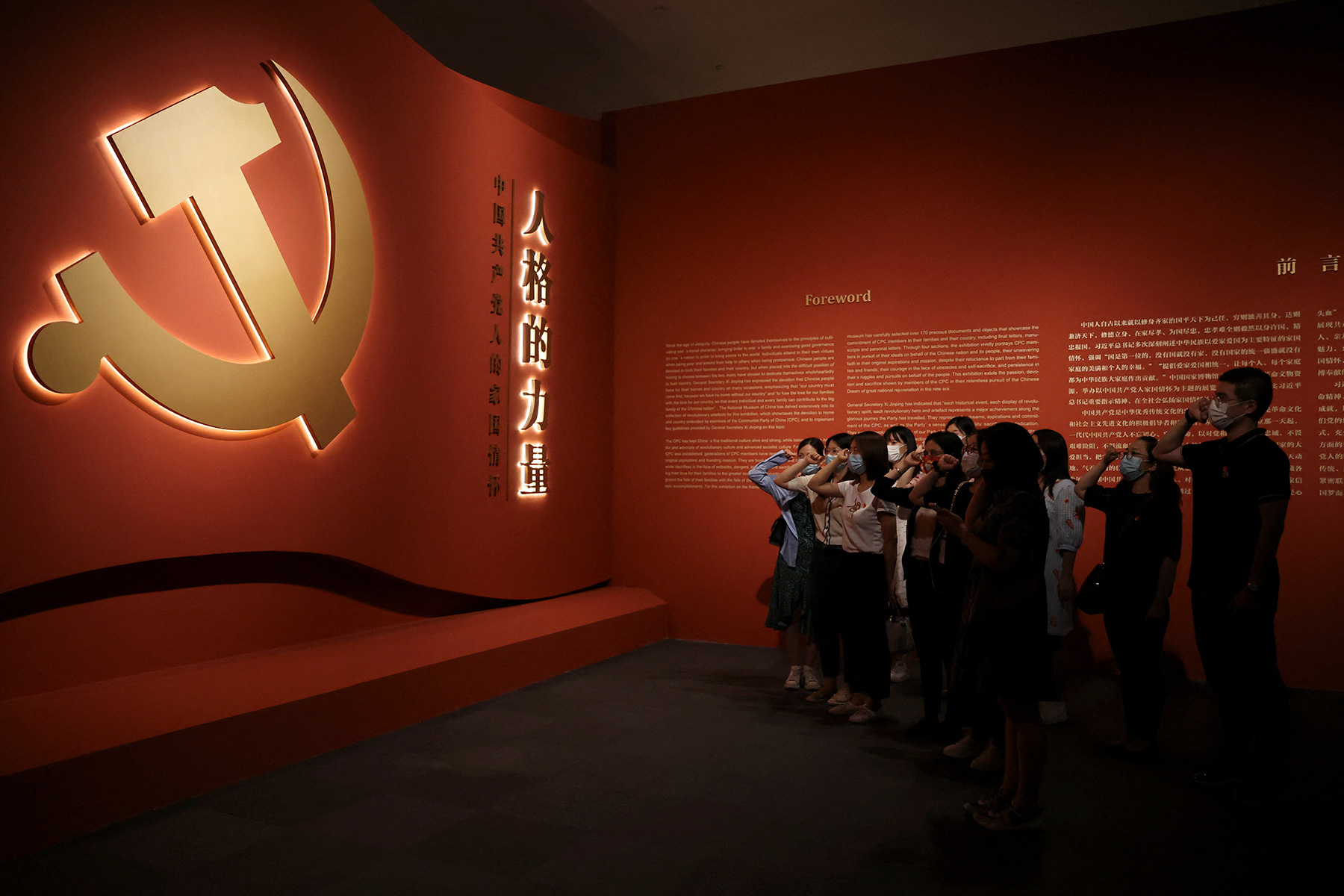In the modern science of international relations, defining the essential features of modern superpowers has remained a bone of contention. What makes a true superpower stand above the rest? Is there a universal set of traits that distinguishes a few leaders from many outsiders? Until now, the key criteria for a “superpower” have mainly been considered by scholars in a material way.
We can suggest that a noticeable difference between a superpower and other states, along with the superiority of material factors, is the presence of a systemic and consistent political philosophy of international relations. The superpower offers its own unique view of how exactly the world should be arranged, according to what rules it should exist, what its goal is, and why this particular superpower is legitimate in its role. We are talking about a special interpretation of key political concepts in relation to international relations—power, authority, justice, equality, etc. Such an interpretation should be based on a deep intellectual tradition and one’s own practical experience, which make the arguments of the proposed political-philosophical doctrine convincing both for oneself and for others.
It is noteworthy that there are surprisingly few countries that have material power and at the same time have their own political philosophy. In the modern world, only two countries can be distinguished which combine both significant material potential and their own political philosophy: the US and China.
The political philosophy of the United States and the modern West in general is a philosophy of emancipation, liberation and reason-based progress. The European roots of US political philosophy have allowed it to easily take root in the soil of numerous Western countries, although in some places it contradicts individual interpretations “on the ground”. It is also important that there is a powerful modernist potential in such a political philosophy.
The political-philosophical core of the People’s Republic of China is much less well known, simply because Beijing has not strived to actively promote it abroad. The political philosophy of China has long remained largely nationally oriented. However, it has a systemic and deeply reflected character, which yields a high potential outside the PRC. It is based on a view of international relations as a non-zero sum game, the idea of the collectivity of international relations, and a departure from rivalry as the leitmotif of world politics. Marxism is one example of a Western doctrine which China has used to its advantage.
Will there be a clash between American and Chinese political philosophies? Most likely, yes, because China is increasingly perceived in the US as a long-term threat. China avoids copying and mirroring the American allegations against itself by promoting the idea of a non-zero-sum game and thereby turning its political philosophy into an even more visible alternative.
Are the political philosophies of the US and China self-sufficient for them? No. Both the US and China combine their political philosophies with the principles of realism. Like many other players, they proceed from the risk of worst-case scenarios and prepare for them, accumulating resources for mutual deterrence. However, political philosophy allows you to maintain the global legitimacy of your influence or to claim it.
Does Russia have its own political philosophy? The answer so far is rather negative. Russia has returned in its foreign policy to the principles of realism, which was already an achievement for its time. But it is too early to talk about a systemic and deeply developed political philosophy. There is a set of still-fuzzy, sometimes contradictory ideas and concepts, as well as their interpretations and slogans derived from them. The system of Russian views clearly lacks modernist potential.
Perhaps, a lack of political philosophy is now Russia’s advantage. Russia will develop its own unique experience, which will allow it to avoid the mechanical copying of other people’s ideas, mixing them in its own practice. The maturation of political philosophy takes time, as does the cultivation of its material base.
In the modern science of international relations, defining the essential features of modern superpowers has remained a bone of contention. What makes a true superpower stand above the rest? Is there a universal set of traits that distinguishes a few leaders from many outsiders? Until now, the key criteria for a “superpower” have mainly been considered by scholars in a material way.
A superpower must have economic potential that far exceeds that of other countries, military power, critical technologies, a developed scientific and industrial base, and human capital. The totality of such material opportunities provides measurable, albeit not controversial, criteria for ranking countries. The situation with non-material factors is much more complicated. Their quantitative measurement is difficult, if not impossible. Their assessment is too subjective and potentially vulnerable to distortion. Whose culture is stronger? Whose ethics are correct? Whose value system is better? Such questions lead to value-oriented disputes, but do little to distinguish the superpowers from other players in the international arena. Meanwhile, this is where one of the most important criteria lies.
We can suggest that a noticeable difference between a superpower and other states, along with the superiority of material factors, is the presence of a systemic and consistent political philosophy of international relations. The superpower offers its own unique view of how exactly the world should be arranged, according to what rules it should exist, what its goal is, and why this particular superpower is legitimate in its role. Moreover, political philosophy is neither a set of slogans and clichés, nor a pretty wrapper or simulation. It is neither an ideology nor a utopia. All of the above may be derived from political philosophy, but not exhaust its content. We are talking about a special interpretation of key political concepts in relation to international relations—power, authority, justice, equality, etc. Such an interpretation should be based on a deep intellectual tradition and one’s own practical experience, which make the arguments of the proposed political-philosophical doctrine convincing both for oneself and for others.
Can a country represent a value only due to material factors? Undoubtedly. Ultimately, the state can concentrate significant power and live exclusively in accordance with the principles of realism, pursue a pragmatic policy, advance its material interests, and achieve dominance where possible. However, bare realism will sooner or later mark the boundaries of legitimacy. The dominance of the bayonet and the purse strings will have shaky ground without a clear understanding of why and for what it exists.
Can a country broadcast an influential political philosophy while lagging behind materially? Also definitely. At a certain moment, it can be a model of stoicism or heroism, a carrier of innovative and attractive ideas. But without a material base, there is a risk that these will just remain hot air, remaining good wishes alone.
It is noteworthy that there are surprisingly few countries that have material power and at the same time have their own political philosophy. It would seem that creating a political-philosophical doctrine is much easier than designing a missile or a nuclear bomb. One can unite “smart people”, edit the results of their “brainstorming”, write basic works, and make manuals for propagandists—that’s all. In fact, many of these creations crumble and get lost in the information noise. There are single copies in the hands of single carriers—the same superpowers.
Does the political philosophy of a superpower need to be “sovereign”? Should it be based only on the nation’s intellectual tradition? Certainly not. It is extremely difficult to find exceptionally original political and philosophical doctrines with global influence. As a rule, we are talking about a mixture of universal ethical principles, categories of such major political and philosophical doctrines as liberalism, socialism or conservatism, nationally specific views and principles, and even religious doctrines such as Christianity or Islam.
In the modern world, only two countries can be distinguished which combine both significant material potential and their own political philosophy: the US and China.
The politico-philosophical core of the United States is well known and widely replicated at all levels, from university essays and textbooks to propaganda videos and social media posts. It is based on liberal principles with their appeal to the supremacy of the human mind, the idea of “negative freedom”, justice as fairness, equality of opportunity within the framework of uniform rules, as well as the ideas of democracy derived from them as the optimal form of government and the market as a means of organizing the economy. This political and philosophical code is a product of the European enlightenment and the specific experience of organising the internal life of European countries, which was embodied on the basis of American political experience and multiplied by their material strength. The European roots of US political philosophy have allowed it to easily take root in the soil of numerous Western countries, although in some places it contradicts individual interpretations “on the ground”. It is also important that there is a powerful modernist potential in such a political philosophy. The political philosophy of the United States and the modern West in general is a philosophy of emancipation, liberation and reason-based progress.
The political-philosophical core of the People’s Republic of China is much less well known, simply because Beijing has not strived to actively promote it abroad. The political philosophy of China has long remained largely nationally oriented. However, it has a systemic and deeply reflected character, which yields a high potential outside the PRC. It is based on a view of international relations as a non-zero sum game, the idea of the collectivity of international relations, and a departure from rivalry as the leitmotif of world politics. Modern Chinese political philosophy’s powerful Marxist element gives it a modernist potential, combined with the experience of solving the key problems of China itself. It combines the ideas of people’s democracy with successful experience in solving the problem of poverty, overcoming backwardness, and reducing the sharpness of social inequality. In the modern world, China appears as a country whose ideas have been tested in practice. Yes, many successes have been made possible by integration into the Western-centric global economy. But here, too, China pursues its own philosophical line—a non-zero sum game, borrowing Western experience and combining it with Chinese traditions. Marxism is one example of a Western doctrine which China has used to its advantage.
Will there be a clash between American and Chinese political philosophies? Most likely, yes, because China is increasingly perceived in the US as a long-term threat. China avoids copying and mirroring the American allegations against itself by promoting the idea of a non-zero-sum game and thereby turning its political philosophy into an even more visible alternative. One can argue for a long time about what is primary in the contradictions of the powers—material factors or ideas? Obviously, if necessary, differences of ideas can be used for political mobilisation and the consolidation of allies. The more systematic such ideas are, the easier it is to draw dividing lines.
Are the political philosophies of the US and China self-sufficient for them? No. Both the US and China combine their political philosophies with the principles of realism. Like many other players, they proceed from the risk of worst-case scenarios and prepare for them, accumulating resources for mutual deterrence. However, political philosophy allows you to maintain the global legitimacy of your influence or to claim it.
Does Russia have its own political philosophy? The answer so far is rather negative. Russia has returned in its foreign policy to the principles of realism, which was already an achievement for its time. But it is too early to talk about a systemic and deeply developed political philosophy. There is a set of still-fuzzy, sometimes contradictory ideas and concepts, as well as their interpretations and slogans derived from them. The system of Russian views clearly lacks modernist potential. The question of whether it is necessary in itself can be a matter of debate, but it is clearly built into the system of views of the United States, China and smaller powers. Russia has recent experience in the collapse and loss of its political and philosophical project, which began long before the collapse of the USSR. Perhaps it is the Soviet experience that continues to yield a persistent and unconscious allergy to political philosophy. It is also possible that both the US and China, at some point, will also face the same problem that the Soviet Union experienced—the separation of their doctrine from the real state of affairs. Perhaps, a lack of political philosophy is now Russia’s advantage. Russia will develop its own unique experience, which will allow it to avoid the mechanical copying of other people’s ideas, mixing them in its own practice. The maturation of political philosophy takes time, as does the cultivation of its material base.
First published in the Valdai Discussion Club.







